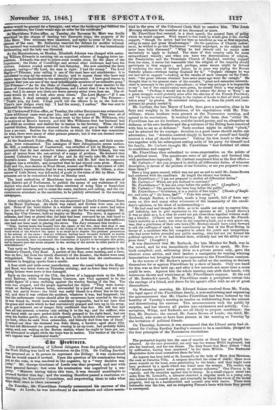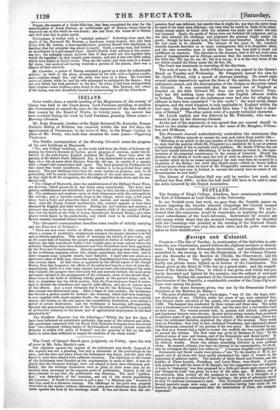Zbe VrobincEs.
The purposed meeting of Liberal delegates from the polling-districts of the West Riding was held at Normanton on the 17th. Sir Culling Eardley Was proposed as a lit person to represent the Riding: it was understood that he would stand if invited. Upon the question of his nomination being Put to the vote, it was resolved in the negative, by a "very decisive ma- jority." Mr. George Goodman of Leeds was then proposed, and met with !nap general favour; but even his nomination was negatived by a ma- jority. "Matters having taken this turn, it was deemed nnadvisable to Proceed further that day; and the meeting therefore paned a resolution re- aPPointing the Executive Committee, and empowering them to take what steps shall seem to them necessary." On Tuesday, hlr. Fitzwilliam formally commenced his canvass of the Riding. At Leeds, he was introduced to the merchants and others assem- bled in the area of the Coloured Cloth Hall 'to receive him. .The Leeds Mercury estimates the number at ten thousand or more.
Mr. Fitzwilliam first restated, in a short speech, the general lines of policy which he would support. With regard to free trade he would give it his cordial support, " though its action had not been so beneficial as was at first-expected, owing to many and great disadvantages." On the questions of Church endow- ment, he wished to go into Parliament " entirely unpledged, as the subject had never been fully discussed." " What he had already said he meant more exclusively to apply to Ireland. The state of that country calls for some extraordinary remedy; and when you have two denominations of religion, the Presbyterian and the Protestant Church of England, receiving support from the state, it seems but reasonable that the religion of the majority should participate in that support ; and, perhaps, some means might be devised
of rendering the state of Ireland better, by in some way paying the Roman Catholic priests—without taxing England for it." "Organic changes he was not incl ned to support "—looking at the results of such changes on the Conti-
nent: "the great reforms obtained here some years ago went far enough." He thought that in the present state of the country, "great and extensive retrench- ment is necessary in the public expenditure; in what way perhaps it is impossible to say"; but if due consideration were given, he should think a way might be
found out "Perhaps it would not be right to redone the Army or Navy"; as a great straggle would probably arise after the elecdon of the French President; and "it would be very heartrending to the traders of Leeds to find all their goods taken away" by pirates. He entreated indulgence, as front his youth and inex- perience he greatly needed it.
Mr. Carbutt, the late Mayor of Leeds, then gave a narrative, clear in its facts and weighty in its reflections, of his negotiations with Mr. Fitz-
william; whose brothers were present at the Normanton meeting, and
agreed to its resolutions. It resulted from all the facts, that "either Mr. Fitzwilliam has set his brothers, and the landed gentry, and us, altogether at
defiance, or his own brothers and the rntlemen of the Riding have connived with him to set us at defiance." Such conduct might be called "pluck," and be admired for its courage: devotion to a good cause should excite our admiration; but devotion exerted simply in favour of oneself and family interest is what all should deprecate." Taking his first insult to the elec- tors together with his subsequent setting aside of his party for himself and his family, Mr. Carbutt, thought Mr. Fitzwillitun "bed forfeited all claim to confidence and support."
Mr. Fitzwilliam then submitted to cross-examination on the points of his political creed. The questioners were of all grades, and ferreted him with pertinacious ingenuity. Mr. Carbutt nonplused him at the first effort— Mr. Carbutt--" Are you prepared to abolish all differential duties, of whatever description, in favour of the produce of our Colonies; or are you prepared to con- tinue them?"
Here a long pause ensued, which was not put an end to until Mr. James Brown had conferred with the candidate. At length the silence was broken. Mr. Fitzwilliam—" I am not prepared to abolish all differential duties." Mr. Carbutt—" Which are you inclined to continue?"
Mr. Fitzwilliam—" It has not come before the public yet." (Laughter.) Mr. Carbutt—" The question has been long before the public." Mr. Fitzwilliam—" Gentlemen, it is a matter of free trade." (Shouts of laugh- ter, and cries of" Go home, lad!" "Take hint away ! ")
Mr. Joseph Barker, a Chartist, made a long speech, full of keen sar- casm on this and many other evidences of the immaturity of the -candi- date's opinions, or his want of understanding- " He had read and thought so little, as to be unable not only to express him- self definitely, but to give expression to his opinions at all. (Loud cheers.) It was as plain as a, b, c, that he could not put three ideas together without mak-
ing a blunder. (Cheers and interruption.) He did not mention Mr. Fitzwil- Ham's inability as a bath; but what he did consider a fault, and a very grave one,
was, that a gentleman of their own town (Mr. Brown) should have come forward to ask the suffrages of such a vast constituency as that of the West Riding in favour of a candidate who felt compelled to admit his youth and inexperience
who had never before attended any public meeting, who had not yet formed his political opinions, or if he had formed them, evidently had not the ability to ex- press them." (Laughter.)
It was discovered that Mr. Roebuck, the late Member for Bath, was in the crowd, and he was immediately called forward to speak. Mr. Roe- buck complied; and, addressing them as a private person only, gave the electors some advice, and their leaders a castigation for venting whining lamentations but bringing forward no opponent to the Fitzwilliam nominee. In the course of Mr. Barker's speech he called on the meeting to declare themselves for or against Fitzwilliam by a show of hands. Only one hand for him was at first held up; and after a few seconds not more than a score could be seen. Against him the whole meeting cast aloft their hands, with boisterous shouts and witticisms at Mr. Fitzwilliam's expense. At the end of Mr. Roebuck's speech, Mr. Fitzwilliam made a precipitate retreat into the carriage of a friend, and drove for his agent's office with an air of great discomfiture.
On Wednesday morning, Mr. Edward Baines received from Mr. Tottie, the legal agent of the Fitzwilliam family, a neteauthorizing and requesting the announcement that Mr. Charles Fitzwilliam bad been induced by the hostility of Tuesday's meeting to resolve on withdrawing from the contest and discontinuing his canvass. This announcement took the public by surprise, and has thrown all parties into excitement and activity. Con- servatives, Whigs, and Radicals, are all likely to propose candidates: the first, Mr. Denison; the second, Mr. James Brown of Leeds; the third, Mr. Roebuck, who seems to have been present at the meeting on Tuesday 'by the invitation of political friends.
On Thursday, however, it was announced that the Liberal party had ob tamed Sir Culling Eardley Eardley's consent to be a candidate, pledged to the four principles of the Normanton resolutions.
The protracted inquiry into the case of murder at Strood has at length ter- minated. As the case proceeded, not only was the woman M'Gill implicated, but also her husband, and her son James. 1 he Jury found that Mary Abbott "died by suffocation, having been murdered" by the three M'Gills. The Rochester Magistrates have since committed them for trial. An inquest has been held at St. Leonard's on the body of Mary Ann Newman, the cook at Catarina Villa. A surgeon described the cause of death; there were seven wounds on the head, some penetrating to the brain; and they might have been produced by a spade which was found near the woman. The verdict was "Wilful murder against some person or persons unknown." One Pierson is in custody, and the suspicion against him is strong. In a small coppice about two miles from St. Leonard's, a labourer observed a singular mark on a young ash;. this induced him to search about; and eventually he found the whole of the stolen property, tied up in a handkerchief, and covered over with leaves. There were footmarks near the tree, and on comparing Pierson's boots with them they proved. to correspond.
Pepper, the master of a Goole billy-boy, has been committed for trial for the manslaughter of Sarah Dawson, an unfortunate girl of Boston, whose dress he wantonly set on fire while he was drunk: she ran from the house all in flames, and died next day in great agony. Nottingham is visited with a "suicidal endemic." Following close upon the death of the Reverend Mr. Browne, a handsome young woman, who had been living with Mr. Aulton, a lace-manufacturer, poisoned herself with laudanum, on learning that her protector was about to marry. Gadd, a young man, had formed an attachment to a girl named Cant; Gadd's friends were adverse to his marry- ing her; the unhappy couple declared that if they could not live together they would die together; so they bought some arsenic, and put it into two little cakes, which were baked at Cant's house. They ate the cakes, and were soon in a dread- ful state; but medical aid having removed a portion of the poison, there was a chance of their recovery.
Mr. Crowther, a grocer of Beam, occupied a garret as a store for inflammable articles; he went to the place, accompanied by his wife, with a lighted candle; some naphtha caught fire, and the room was soon in a blaze. Mr. Crowther raised an alarm, while he and his wife attempted to extinguish the flames: they not only failed, but both perished in the fire; for when it had been extinguished, their corpses—mere cinders—were found in the ruins. Mrs. Dawson, the owner of the house, WAS 141.80 dreadfully burned in endeavouring to aid the Crowthers.



























 Previous page
Previous page